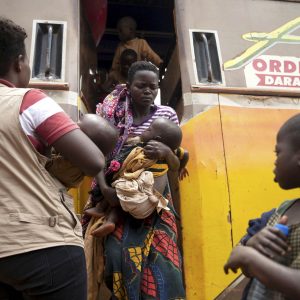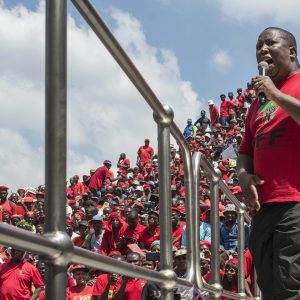Magufuli bulldozes human rights in Tanzania
In the build-up to the Tanzanian general elections on 28 October, the president enforced restrictions on citizens, the media and opposition parties, all while belittling women and girls.
Author:
28 October 2020

President John Magufuli ascended to power in Tanzania in 2015 and was nicknamed Tinga Tinga, Kiswahili for “The Bulldozer”, for his corruption crackdown and policy pushes. Since then, he has deteriorated dangerously into a women-loathing president, bulldozing his way through human rights.
Gender activist Mwanahamisi Singano says the lack of focus on gender equality and representation has resulted in a tough few years for women in Tanzania. “The president has come out, dehumanising women in ways we have never seen, using women as an insult, as a punching bag, to ridicule. Most of his jokes are about women, even on TV. He has set a bad tone about women and who they are overall,” she says.
When Magufuli won the 2015 election and selected Samia Suluhu as his vice-president, it was a big victory for the country. As it stands now, there are fewer women nominees for parliamentary seats in the ruling party than there used to be.
“The position of women has declined, we no longer advance women’s rights and this is unfortunate when we have the first [woman] vice-president, Samia Suluhu,” says Singano. “It’s the position of a person who has to stand in when a president is not there. It’s a powerful position but it’s powerless. Nonetheless … it was a powerful gesture. We did expect that her position as first woman VP would alter the image of women’s … ability to lead.”
Related article:
Singano wrote an open letter to Suluhu after Magufuli banned pregnant girls and young mothers from attending school in 2017, while pupils were forced to undergo pregnancy tests. International bodies and donors intervened, freezing funding over the decision.
At some stage, women were dissuaded from family planning because this was viewed as a “Western agenda” and Singano says Magufuli is on record questioning officials and quipping, “If you are angry, go take that anger to your wife.” He gave rise to Mashangazi wa Taifa (Aunts of the Nation) when he said he would start by beating the aunts of members of Parliament who wanted to strike over a cashew crop crisis in the south, known as the Shangazi effect.
Election violence and crackdown
Magufuli’s party, Chama Cha Mapinduzi (CCM), has a two-thirds majority in semi-autonomous Zanzibar. On 26 October, the police shot and killed a number of people in Pemba, Zanzibar, ahead of the election and injured others. It’s alleged that the army attempted to distribute premarked ballots at polling stations. Citizens in the area tried to prevent this and were tear gassed, but when the crowd did not disperse, the police used live ammunition. Those injured could not seek medical attention as all the roads leading to hospitals were manned by security forces.
Candidates of constituencies run by opposition parties were disqualified. The disqualification was tactical and key to ensuring the CCM’s two-thirds majority.
The votes from Zanzibar are not that significant in terms of the mainland presidential vote, but they matter in terms of the members of Parliament because of the power balance between the CCM and an opposition party, ACT-Wazalendo.
“It seems that … CCM is trying to make sure that ACT-Wazalendo doesn’t get a lot of MPs [members of Parliament] from Zanzibar because they will tilt the balance of that Parliament and affect the two-thirds majority, so Zanzibar is significant in that regard,” says Chachage.
Internet access to certain platforms was also blocked just a day before the elections, which were fully domestically funded. The police took it upon themselves to allow or disallow public engagements, and cracked down on even internal organising because a permit was required.
Magufuli gave the order through a minister earlier this year that live coverage of Parliament be stopped, saying that they have a right to only give information that they think the public needs to hear.
Singano says Magufuli has blurred the line between party and state, to have a machinery to suppress dissenting voices.
Related article:
Magufuli has been crushing movements within formal structures and silencing women’s organisations, as well as those who are critical of him and his presidency. Numerous brutal attacks on citizens, business and religious communities, opposition political leaders, elected members of Parliament, media houses’ lawyers and journalists have been reported, with all being drowned out, banned, closed down or suspended.
In October 2019, reports from two different human rights watchdogs accused Magufuli of presiding over rising levels of flagrant rights assaults against political opponents and activists.
The government has enacted laws and guidelines to restrict operations of non-governmental organisations, making it extremely difficult for them to operate. Recently, the Tanzanian Coalition of Rights Defenders had its bank account frozen.
A number of media outlets have been banned or ordered to close down. Kwanza TV was suspended because it aired information from the United States embassy that the government said was incorrect. The Statistic Act of 2015 made it illegal to “publish false official statistics” or to “disseminate information that would result in the distortion of facts”.
The same act was used to arrest opposition leader Zitto Kabwe in 2017 after he made comments about the country’s economic growth.
“They want to contain information and to shape the narrative, they have made a lot of progress in that role, the media has to do what the law says and the law favours the state,” says Singano.
Political history
Magufuli started off as public works minister with a focus on construction. Shingano says he was seen as the mechanical engineer who gets the job done, focusing on roads and railways but not so much on social rights.
“From the beginning of his presidency, he did say there will be no opposition party in Tanzania [by 2020] and he worked to suppress political activities. For the past years, the opposition can’t have rallies, police and [the army] arrest them,” she says.
Very soon after Magufuli was elected, he announced a blanket ban on political activities, only exempting his ruling party. He also amended the Political Parties Act, empowering government-appointed registrars to deregister parties and imprison anyone engaged in campaigning or registration drives for votes before elections. He has suspended opposition campaigning many times, ensuring an uneven contesting ground.
These were moves towards solidifying a one-party state in a country that had enjoyed a multiparty democratic system since 1992. For the first three decades after Tanzania’s independence in 1961, the country was a one-party state with the CCM – one of the longest-ruling parties in Africa – at the helm under Julius Nyerere.
In early October, opposition leader Tundu Lissu was prevented more than once from addressing a crowd and later banned from campaigning for a week. He is the leader of Chama cha Demokrasia na Maendeleo (Chadema), Kiswahili for the Party for Democracy and Progress. From 2005 until 2015, Chadema became the leading opposition party in the country with 41% of the presidential vote in the 2015 election.
Related article:
Lissu’s return to Tanzania in July comes after he fled to Kenya and then Belgium following an assassination attempt in 2017. Lissu was followed from Parliament to his residence by unknown armed assailants and shot 16 times. There have still been no arrests or leads in the case, and none of his medical costs were taken on by Parliament because the president has allegedly prohibited the release of the funds.
Before that, Lissu was arrested and prosecuted eight times but not convicted.
“They use the law. Most politicians have been in court several times, with current or old cases, where they have said or done something. It has been a mission to suppress political activities. The idea is to make the ruling party supreme, and make the state and CCM one thing,” says Singano.
Political analyst and lecturer Chambi Chachage says Magufuli comes from a highly patriarchal background and is a populist leader whose populism works in certain areas, but that Chadema is closing the gap in the rural vote, on which Magufuli and the CCM thrive.
Chachage says the opposition has grown and become stable over the past decade despite the repressive political space making it difficult to organise and mobilise.
He says Magufuli is no longer viewed as a corruption buster or a president of the people or downtrodden. “That honeymoon was over long ago … The crackdown on corruption became almost banal, it reached a point where it was not any different from his predecessors. His predecessors managed to prosecute a few high-profile corruption cases … but that hype is no longer there, the party is no longer using [anti-corruption] as their main brand … Now they focus on development projects,” he says.
Increased term limit
Chachage says there are strong indications that, with the right number of seats, Magufuli may extend the term limit. This would not come as a surprise even though Magufuli has denied such an intention. His party has encouraged this without much dissent.
“The voices about extending term limits have been much louder. The way the current president has governed… to a lot of critics, it’s an authoritarian way of governing so that gives them more belief that if he could [enforce] all of this authoritarianism over the last few years, what would stop him from extending his term limits if he has a stronghold on the Parliament?” he says.
Related article:
The country has a solid precedent of a smooth transfer of power, albeit within the CCM, and previously three presidents have served 10 years.
“The elections are de facto normally not free and fair, and they will be worse this time because of the dynamics … The only thing that might help is a pushback from the opposition parties and civil society, which were there in previous elections, but I don’t know to what extent it’s going to be significant,” says Chachage.
In a Zoom meeting, disbarred lawyer Fatma Karume told other panellists that institutions in the country were too weak to do anything if the election did not go fairly.
Whether the elections were free and fair will continue to be up for discussion as votes are tallied. But beyond the political, economic and judicial issues, there are social, cultural and gender issues to be tackled after the typical turbulence of elections.




